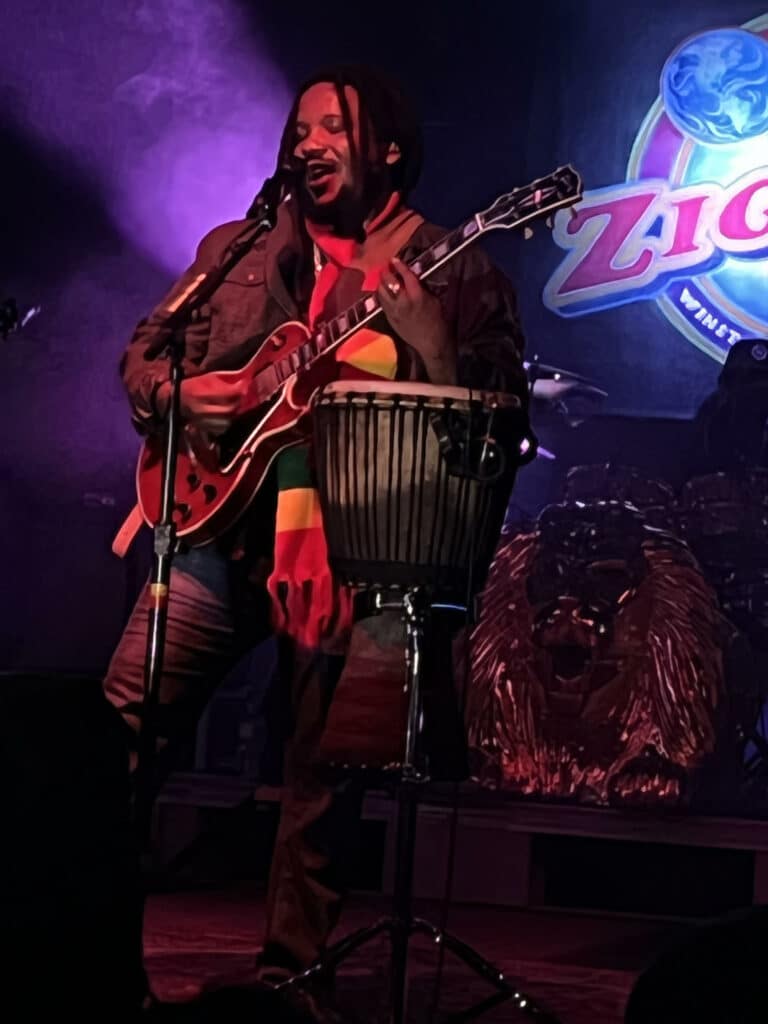Features
Review: Stephen Marley Brings Spirit Of Reggae To North Carolina’s Ziggy’s With ‘Babylon By Bus Tour’

Stephen “Ragga” Marley’s “Babylon by Bus Tour” stop at Ziggy’s in High Point, N.C., on July 3 was a timely reminder of the spirit of reggae, the people who create it and the fans who can’t get enough.
The powerful messages of struggle, oppression, and survival shined brighter than the fireworks sparkling overhead. The eight-time Grammy winning singer, songwriter, musician, and producer effortlessly soared through his 40-year career and iconic father’s catalog.
The tour, which is named after Bob Marley’s 1978 live album, runs through the summer with a rotating cast of rising reggae talent, including Kabaka Pyramid, which opened for Stephen Marley at the open-air venue in High Point.
The second son of Bob and Rita Marley began the night with “Punky Reggae Party” from Bob Marley’s 1977 album, Exodus. “My name is Stephen Marley, and I’ve brought you some reggae music.”
The audience was a vocal and vibrant multi-generational, multi-ethnic mix of tie-dye former hippies, Jamaican faithful draped in the Caribbean island’s colors, and Rastas waving Ethiopian flags of bright red, gold and green.
This was not a surface-level Red Stripe concert. Stephen Marley wasted no time expressing his personal views on free speech and politicians selling out their constituents with “Chase Dem” and “Iron Bars” from his 2007 record, Mind Control, with a loud chorus of “Rebels for life, we rebel for right.”

He tapped his 2011 record, Revelation Pt. 1 – the Root of Life, for his “Can’t Keep I Down” and “Break Us Apart,” which was written by Stephen Marley and Desmond Smith. Marley was deft on guitar giving room for the classic covers to breathe and then follow up with a groove so reckless and quick it left the audience breathless.
He performed a heart-tugging “Hey Baby” before launching into a melody of Bob Marley classics including “Three Little Birds,” “Buffalo Soldier” and “Iron Lion Zion.” Close enough to the originals to satisfy the purists, Marley’s skill as a producer and arranger were very apparent with subtle lifts to the originals that made them feel contemporary and fresh.
The party mood returned in earnest on “One Good Spliff,” with a torrent of bubbles floating through the air on plumes of smoke. Written by Stephen Marley and his older brother Ziggy Marley, the song was released in 1999 by Ziggy Marley and the Melody Makers, which consisted of Stephen Marley and his siblings. Driving home the songwriting family tradition, Stephen Marley performed “Get Up Stand Up,” which was written by his father and fellow reggae icon Peter Tosh and released in 1973.
The urgency of “Get Up” was the perfect lead in for “Rockstone” from Stephen Marley’s Revelation Pt. 2 – The Fruit of Life, which was released in 2016, and “The Traffic Jam” and
“The Mission” from Mind Control with hard-leaning percussion and blistering lyrics.
The encore didn’t disappoint with a mix from the Stephen/Bob Marley songbook including “Jammin,’” “Revelation Party” and “One Love,” with the lyrics “One love, one heart. Let’s get together and feel all right” appropriately closing out the show.
With a club motto of “Roots, Rock and Reggae,” Ziggy’s was an ideal, outdoor venue for the tour. The mood was “elevated” and felt nostalgic, like an abbreviated trip to the first Reggae Sunsplash in 1978. The spacious interior courtyard provided room for vendors, artisans and food trucks selling jerk chicken and other Jamaican cuisine, which felt like an authentic commitment to the culture.
The venue, which opened April 1, was at its capacity of 1,500. Independently owned by live industry veteran Jay Stephens, Ziggy’s is nestled between a 110-year-old former hosiery mill and a busy train track. The set stage had ample sound that was crisp throughout the courtyard of wrought iron furniture, funk yard art, and verdant planters.
Timing of the event on the cusp of Independence Day brought a weighty significance to many of the songs as well as Stephen Marley’s overarching message: “Don’t mess with my freedom.”